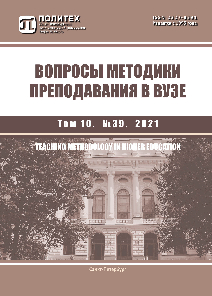Practice of using project method in teaching students foreign language for specific purposes
The article presents the results of the theoretical analysis of scientific literature devoted to the practice of using the project method in teaching students language for specific purposes. Based on the analysis, the main pedagogical conditions necessary for the
implementation of project activities in a professionally-oriented foreign language are identified, namely, the formed holistic attitude of students to the study of a foreign language and foreign language culture, the implementation of the project in the context of a future profession, the formation of the motivational field to increase students' interest in the study of a professionally oriented foreign language, the use of modern information technologies, the presence of a clearly regulated system for evaluating project activities, etc. As the result of the project method application analysis in practice, the advantages and disadvantages of this method are highlighted. Among the advantages the following are noted: increased motivation of students to study with the use of authentic materials and the choice of topics of interest to the students themselves; realization of the students’ creative potential; solving the tasks of personality-oriented learning due to the fact that each student can choose the strategy of working on the project himself, as well as the use of the most preferable methods and tools; formation of research skills. Among the disadvantages it is noted that the project method requires significant time and special training from a teacher or project manager; if students do
not have the skills and experience of working in a group, there is an unequal distribution of the study load; students strive to use their native language when discussing the project, its organization and preparation for project presentation, and this cannot be controlled by the teacher in extracurricular time.



